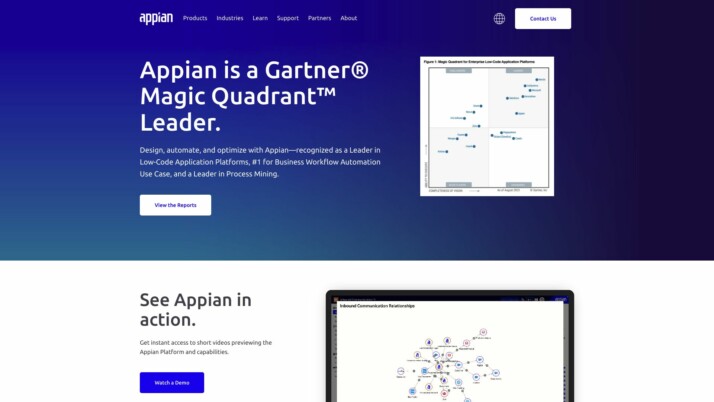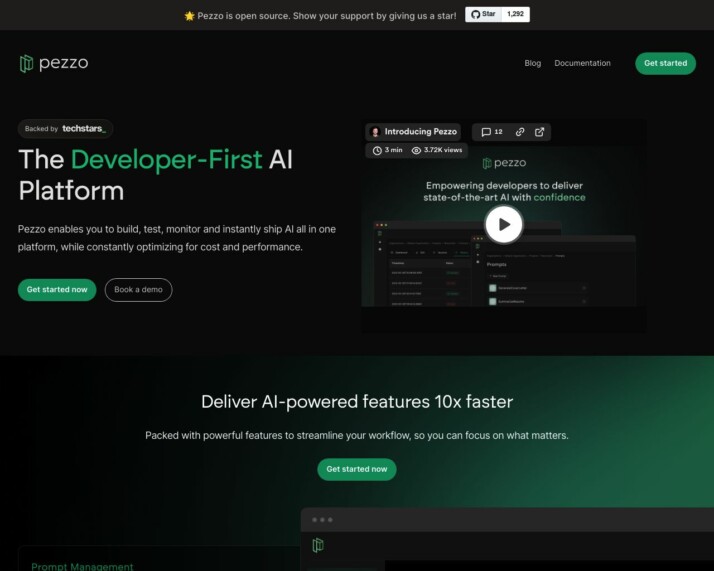AI development platforms empower businesses to harness cutting-edge technology, automate processes, and gain competitive advantages. This comparison examines Appian vs. Pezzo, and SmythOS — three distinct approaches to AI integration and development.
Appian offers a low-code platform for enterprise-grade AI integration, Pezzo provides an open-source toolkit for prompt engineering, while SmythOS delivers a comprehensive solution combining powerful features with user-friendly design. We’ll explore each platform’s strengths, limitations, and ideal use cases to help you determine the best fit for your organization’s AI ambitions.
Appian Overview
Appian empowers businesses to harness artificial intelligence through its low-code platform. The software integrates AI capabilities into enterprise workflows, allowing organizations to automate processes and enhance decision-making without extensive coding expertise.

Appian’s AI Skill Designer enables users to create custom AI models using a visual interface. This tool democratizes AI development, making it accessible to both technical and non-technical team members. The platform excels in document processing, leveraging AI for tasks like classification and data extraction from various file formats including PDFs and Word documents.
Appian’s AI models can be seamlessly integrated into existing business processes, automating tasks such as email routing, document analysis, and data entry.
The platform’s strength lies in its ability to combine AI with robust process automation. Appian’s AI models can be seamlessly integrated into existing business processes, automating tasks such as email routing, document analysis, and data entry. This integration enhances operational efficiency and accuracy across various departments.
While Appian offers powerful AI capabilities, it may not provide the same level of advanced features as specialized AI platforms. The software focuses on practical business applications rather than cutting-edge AI research or development. However, this approach makes Appian particularly suitable for enterprises looking to implement AI solutions quickly and effectively within their existing workflows.
Appian prioritizes data privacy and security, ensuring that AI models and data remain under the organization’s control. This feature addresses concerns about data protection and compliance, making it an attractive option for industries handling sensitive information. The platform’s scalability also allows businesses to expand their AI implementations as needs grow, supporting both small-scale projects and enterprise-wide deployments.
Pezzo Overview
Pezzo delivers an open-source AI development toolkit that streamlines prompt design, management, and collaboration. The platform empowers developers to create, host, and manage AI agents efficiently, focusing on maximizing productivity and visibility throughout the AI development process.

Pezzo’s standout features include effortless prompt and version management, enabling developers to handle multiple AI prompts and versions seamlessly. This capability significantly accelerates the delivery of AI solutions, allowing teams to iterate quickly and maintain version control. The platform also offers conversion-boosting tools through A/B testing, targeting, and experiments, helping users optimize their AI models’ performance and improve conversion rates.
Cost optimization stands out as a key benefit, with Pezzo providing tools to maximize cost efficiency in AI operations. Users can potentially save up to 50% on their AI-related expenses…
Cost optimization stands out as a key benefit, with Pezzo providing tools to maximize cost efficiency in AI operations. Users can potentially save up to 50% on their AI-related expenses, making it an attractive option for businesses looking to balance innovation with budget constraints. The platform also includes advanced features like real-time trading and charts, enhancing the overall AI development experience by integrating real-time data and analytics into AI models.
Pezzo’s comprehensive troubleshooting capabilities set it apart from competitors. The platform offers execution history, time-travel debugging, and test suites, enabling developers to deploy AI models with confidence. These tools provide detailed observability into AI operations, reducing debugging time and helping teams pinpoint issues quickly. This level of insight proves invaluable for efficient operations and effective troubleshooting, especially in complex AI development scenarios.
While Pezzo excels in many areas, it may face challenges in highly specialized or niche AI applications that require extensive customization beyond its current offerings. Additionally, as an open-source platform, it might require more technical expertise to fully leverage its capabilities compared to some proprietary solutions with more guided user experiences.
Feature Comparison
Appian and Pezzo offer distinct approaches to AI development and integration. Appian excels in enterprise-grade low-code AI integration, while Pezzo provides an open-source toolkit for prompt engineering and management.
Appian’s strength lies in its robust process automation capabilities combined with AI. It offers prebuilt AI features like document classification and extraction, seamlessly integrating these into existing business workflows. This integration enhances operational efficiency across departments. Appian also prioritizes data privacy and security, making it suitable for industries handling sensitive information.
Pezzo, on the other hand, focuses on streamlining the prompt design and management process. It offers tools for version control, A/B testing, and cost optimization specifically for AI prompts. Pezzo’s open-source nature allows for greater customization and community-driven development, potentially appealing to developers seeking more control over their AI toolkit.
A key difference emerges in their core components. Appian provides a comprehensive low-code platform with built-in AI capabilities, while Pezzo concentrates on prompt engineering tools. This gap means Appian may offer a more complete solution for businesses looking to integrate AI into their existing processes, while Pezzo caters to developers focused on fine-tuning AI prompts and optimizing costs.
In terms of security, Appian’s enterprise focus results in robust data privacy features and compliance tools. Pezzo, being open-source, may require additional configuration to meet enterprise-level security standards. This distinction highlights Appian’s readiness for sensitive enterprise environments, whereas Pezzo might need supplementary security measures for similar use cases.
Feature Comparison Table
| Appian | Pezzo | SmythOS | |
|---|---|---|---|
| CORE FEATURES | |||
| Hosted Agents (Dev, Production) | ❌ | ❌ | ✅ |
| Visual Builder | ✅ | ❌ | ✅ |
| No-Code Options | ✅ | ❌ | ✅ |
| Memory & Context | ✅ | ❌ | ✅ |
| Autonomous Agents | ❌ | ❌ | ✅ |
| Multi-Agent Collaboration | ❌ | ✅ | ✅ |
| Agent Work Scheduler | ❌ | ✅ | ✅ |
| SECURITY | |||
| Constrained Alignment | ✅ | ❌ | ✅ |
| IP Control | ✅ | ❌ | ✅ |
| COMPONENTS | |||
| Foundation AIs | ❌ | ✅ | ✅ |
| Huggingface AIs | ❌ | ✅ | ✅ |
| Zapier APIs | ❌ | ✅ | ✅ |
| Data Lakes | ✅ | ❌ | ✅ |
| DEPLOYMENT OPTIONS (EMBODIMENTS) | |||
| Deploy as Site Chat | ❌ | ✅ | ✅ |
| Deploy as Scheduled Agent | ❌ | ❌ | ✅ |
| Deploy as GPT | ❌ | ✅ | ✅ |
| DATA LAKE SUPPORT | |||
| Hosted Vector Database | ❌ | ❌ | ✅ |
| Sitemap Crawler | ❌ | ❌ | ✅ |
| YouTube Transcript Crawler | ❌ | ❌ | ✅ |
| URL Crawler | ❌ | ✅ | ✅ |
Best Alternative to Appian and Pezzo
SmythOS emerges as the superior alternative to Appian and Pezzo, offering a comprehensive AI automation platform that combines the best of both worlds while surpassing them in key areas. Our platform delivers unmatched flexibility, ease of use, and an extensive feature set that caters to a wide range of use cases.
We provide a visual builder that simplifies the creation of complex AI workflows, making it accessible to users with varying levels of technical expertise. Unlike Appian’s low-code approach or Pezzo’s focus on prompt engineering, our drag-and-drop interface allows for rapid development of sophisticated AI agents without sacrificing customization options.
We provide a visual builder that simplifies the creation of complex AI workflows, making it accessible to users with varying levels of technical expertise.
Our platform excels in multi-agent collaboration, a feature lacking in Appian and only partially addressed by Pezzo. We enable the orchestration of multiple AI agents working together seamlessly, tackling complex tasks with greater efficiency and scalability. This capability opens up new possibilities for businesses looking to automate intricate processes across departments.
We offer unparalleled versatility in deployment options. While Appian focuses on integrating AI into existing business processes and Pezzo concentrates on prompt management, our platform allows deployment as APIs, webhooks, site chats, scheduled agents, and even as GPT models. This flexibility ensures that our AI solutions can be seamlessly integrated into any existing infrastructure or workflow.
We offer unparalleled versatility in deployment options… our platform allows deployment as APIs, webhooks, site chats, scheduled agents, and even as GPT models.
Our commitment to data management and analysis sets us apart. We provide a hosted vector database, support for various data crawlers, and compatibility with multiple file formats. These features, combined with our robust security measures, make us the ideal choice for businesses handling sensitive information or requiring advanced data processing capabilities. With SmythOS, you’re not just getting an AI platform; you’re investing in a future-proof solution that evolves with your needs and pushes the boundaries of what’s possible with AI automation.
Conclusion
Appian and Pezzo offer distinct approaches to AI development, each with unique strengths. Appian excels in enterprise-grade, low-code AI integration, seamlessly combining AI capabilities with robust process automation. Its focus on data privacy and security makes it particularly appealing for industries handling sensitive information. Pezzo, as an open-source toolkit, shines in streamlining prompt engineering and management, offering developers granular control over AI development processes.
While both platforms have their merits, SmythOS emerges as the superior choice, offering a comprehensive solution that combines the best of both worlds. Our platform provides a user-friendly, drag-and-drop interface for creating complex AI workflows without extensive coding knowledge. This democratizes AI development, making it accessible to a broader audience while still offering the depth that experienced developers crave.
SmythOS stands out with its extensive integration ecosystem, supporting over 300,000 integrations with various APIs, AI models, and tools. This unparalleled flexibility allows users to seamlessly incorporate AI into existing workflows and business processes. Our multi-agent orchestration capabilities enable teams of AI agents to collaborate on complex tasks, pushing the boundaries of what’s possible with AI automation.
For those ready to experience the future of AI development, we invite you to explore our diverse range of AI-powered agent templates. These templates cover multiple business categories and are designed to streamline processes across various functions. To truly unlock the potential of AI for your organization, create a free SmythOS account and start building AI agents with no time limit or risk. With our 30-day money-back guarantee, you can confidently deploy SmythOS agents anywhere, transforming your workflow and revolutionizing your approach to AI integration.